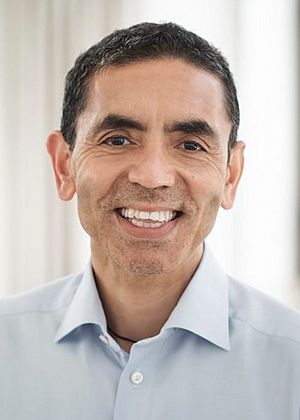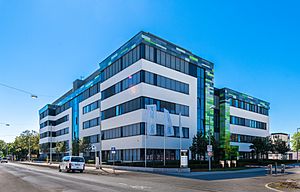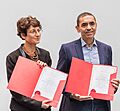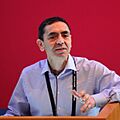Uğur Şahin facts for kids
Quick facts for kids
Uğur Şahin
|
|
|---|---|

Şahin in 2019
|
|
| Born | 19 September 1965 İskenderun, Hatay Province, Turkey
|
| Citizenship | Germany, Turkey |
| Alma mater |
|
| Occupation | Oncologist, immunologist |
| Years active | 1991–present |
| Known for |
|
| Office | CEO BioNTech SE |
| Term | 2008–present |
| Spouse(s) | |
| Children | 1 |
| Awards |
|
| Signature | |
 |
|
Uğur Şahin (born September 19, 1965) is a German scientist and business leader. He is a doctor who specializes in cancer and the immune system. He is best known as the co-founder and CEO of BioNTech. This company created the world's first mRNA vaccine to fight COVID-19.
Şahin also helps lead the scientific team at the Helmholtz Institute for Translational Oncology (HI-TRON). This is a top research lab in Mainz, Germany, which he helped start in 2018. He has helped invent many things, with over 500 patent applications. His main work focuses on finding new ways to fight cancer and understand the immune system.
Şahin's family moved to Germany from Turkey when he was four years old. He grew up in Cologne and studied medicine at the University of Cologne. He earned his doctorate there, focusing on how the immune system can fight cancer. He worked as a doctor and researcher at hospitals in Saarland and Zürich. In 2000, he started a research group at the University of Mainz. He became a professor of experimental oncology in 2006.
In 2001, Şahin started working on new businesses while still at the University of Mainz. He co-founded two drug companies with his wife and partner, Özlem Türeci. The second company, BioNTech, worked with Pfizer Inc to create a major vaccine for the COVID-19 pandemic in 2020. Because BioNTech became so valuable, Şahin and Türeci became some of the wealthiest people in Germany with Turkish roots.
Contents
Early Life and Education
Şahin was born on September 19, 1965, in İskenderun, Turkey. When he was four, he moved to Germany with his mother to join his father. His father worked in a Ford factory in Cologne. As a child, Şahin loved football and reading popular science books from the library.
At first, his primary school teacher suggested he go to a type of school that would make it hard to attend university. But with help from a German neighbor, he went to a gymnasium instead. He took advanced classes in math and chemistry. He graduated in 1984, becoming the first child from a Turkish "guest worker" family at his school to do so.
Şahin met his future wife, Özlem Türeci, while working at the Saarland University Hospital. They married in 2002 and had a daughter four years later. Because of their shares in BioNTech, Şahin and his wife are among the richest people in Germany.
University Studies
Şahin studied medicine at the University of Cologne from 1984 to 1992. In 1992, he earned his doctorate degree. His research focused on using the immune system to fight tumor cells. From 1992 to 1994, he also studied mathematics.
Career in Science
Şahin worked as a doctor specializing in internal medicine and cancer from 1991 to 2000. He worked at the University Hospital of Cologne and then at the Saarland University Hospital. In 1999, he became qualified to teach in the field of molecular medicine and immunology. After a year of research in Zürich in 2000, he joined the University Medical Center Mainz.
Since 2001, he has held important roles in cancer research and immunology there. In 2006, he became a professor of experimental oncology. Şahin sees himself as an "immune engineer." This means he tries to use the body's own defense systems to fight diseases like cancer. His goal is to guide the immune system to "protect us from or lessen certain diseases."
Research at Mainz University
In 2000, Şahin became a research group leader at the University Medical Center Mainz. In 2003, he became the head of the Tumor Vaccine Center. He was an Associate Professor from 2006 to 2013. Since 2014, he has been a full professor at the University Medical Center.
Şahin is also a leader at the University Center for Tumor Diseases Mainz (UCT Mainz), which started in 2011. This center brings together all the groups at the University Medical Center Mainz that work on cancer treatment and research. In 2017, Şahin helped create the new Helmholtz Institute (HI-TRON). This is a partnership between the German Cancer Research Center and TRON. Şahin believes that "cancer can be defeated in the future."
TRON Research Institute
In 2010, Şahin co-founded TRON (Translational Oncology at the University Medical Center of Johannes Gutenberg University Mainz). TRON is a non-profit research institute. It creates new ways to find and treat cancer and other serious diseases. It focuses on personalized medicine and using the immune system to fight cancer. Şahin received the German Cancer Prize for his work in this area. He was TRON's scientific director until September 2019. Now, he works as a scientific advisor there.
Ganymed Pharmaceuticals
In 2001, Şahin, his wife Özlem Türeci, and his mentor Christoph Huber co-founded Ganymed Pharmaceuticals. This company developed a special drug called Zolbetuximab. This drug was designed to fight stomach and esophageal cancer. In 2016, the company was sold for over 400 million euros. This happened after studies showed the drug helped patients with advanced stomach cancer live longer.
BioNTech Company
In 2008, Şahin, Özlem Türeci, and Christoph Huber founded the biotechnology company BioNTech in Mainz, Germany. Şahin is the CEO of BioNTech. The company focuses on creating special treatments that use the body's own immune system to fight cancer and other serious diseases. His research mainly looks at using mRNA-based drugs. These can be used for personalized cancer treatments, vaccines against infections, and treatments for rare diseases.
In April 2020, BioNTech, led by Şahin and Türeci, began working on a vaccine for COVID-19. Şahin has many patents related to his work at BioNTech and with partners.
Şahin believes that fighting COVID-19 requires countries to work together and share vaccines fairly. He said there was "no discussion" about making a vaccine available only to certain countries. He also believes that vaccination should be a choice, not forced.
In late 2020, BioNTech partnered with the U.S. drug company Pfizer. They aimed to get approval for a vaccine before the end of 2020. In November 2020, the company announced that their BNT162b2 vaccine was 95 percent effective.
Key Research Areas
Şahin and Türeci have worked together as a scientist-doctor team since 1992. Their early work focused on finding new targets for cancer immunotherapy. They discovered important targets for treating many types of cancers, including stomach, pancreatic, breast, ovarian, prostate, and lung cancers.
Şahin and his team developed ways to make mRNA vaccines better. They found ways to improve the structure of mRNA molecules and how they are delivered to the body. By combining these improvements, they made mRNA vaccines much more powerful. This allowed Şahin to successfully use mRNA for treatments in humans.
mRNA Vaccines for Cancer
One important area Şahin's team worked on is using mRNA vaccines for personalized cancer therapy. This technology targets unique changes (mutations) found only in a patient's tumor cells. Since mRNA vaccines can be easily designed for any target, the team could create custom mRNA vaccines for each patient's specific tumor mutations. These vaccines are made "on demand" for each person.
mRNA Vaccines for COVID-19
In January 2020, Şahin and his teams shifted their focus from cancer to developing a COVID-19 vaccine. Because the genetic code of the SARS-CoV-2 virus was quickly shared, they could start their mRNA vaccine program. Their flexible mRNA technology and their previous work on cancer vaccines allowed them to develop and test many mRNA vaccine candidates at the same time.
The BNT162b2 was found to be the best candidate for preventing COVID-19. This vaccine uses mRNA inside tiny fat particles. It contains the genetic code for the SARS-CoV-2 spike protein. This vaccine combines many features for better activity, based on the earlier work of Şahin, Türeci, and their teams.
Studies showed that the BNT162b2 vaccine was very effective at creating an immune response. It also proved to be safe and powerful in humans. BNT162b2 became the first mRNA drug approved for human use. It was also the fastest vaccine ever developed against a new pathogen.
Awards and Recognition
Şahin has received many awards for his important scientific work. Some of these include:
- 1995: Merit Award of the American Society of Clinical Oncology (ASCO)
- 2005: Georges Köhler Prize of the German Society of Immunology
- 2019: Mustafa Prize
- 2019: German Cancer Award
- 2020: Financial Times Person of the Year
- 2021: Knight Commander's Cross of the Order of Merit of the Federal Republic of Germany
- 2021: Princess of Asturias Award in Scientific Research
- 2022: Paul Ehrlich and Ludwig Darmstaedter Prize, Germany's most important medical award
- 2022: Louis-Jeantet Prize (with Özlem Türeci and Katalin Karikó)
- 2022: Werner-von-Siemens-Ring (with Özlem Türeci, Katalin Karikó, and Christoph Huber)
- 2023: Pour le Mérite
Images for kids
-
Şahin and his wife Özlem Türeci during an honorary doctorate ceremony in 2021.
See also
 In Spanish: Uğur Şahin para niños
In Spanish: Uğur Şahin para niños




